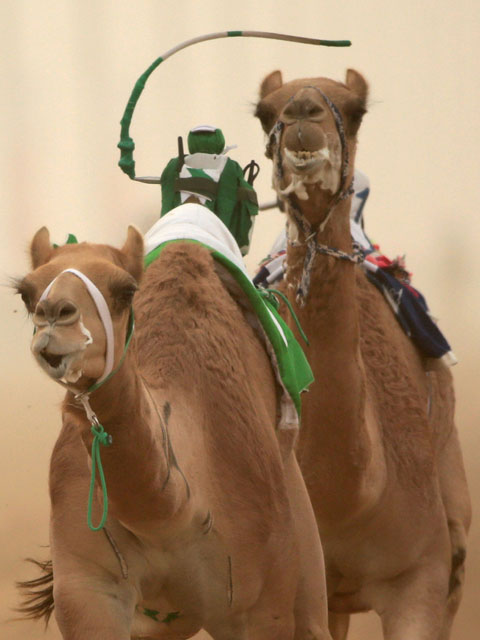The July 2005 issue of the IEEE Spectrum magazine included an update on camel racing, although in Qatar, not Dubai.
"What would the story of racehorse legend Seabiscuit be without jockey Red Pollard? It might be something like that of any future champion racing camel. The centuries-old sport of camel racing has an unfortunate history of kidnapping and half-starving young boys to act as jockeys.
"Addressing that issue, the government of Qatar will turn the reins over to robots by 2007. Officials there contracted with K-Team SA, a specialty robot firm, based in Yverdon-les-Bains, Switzerland, to design and build remote-controlled, Global Positioning System-equipped robotic riders. In training sessions, such as this one on 25 April, the prototype robot spurred its mount to speeds of up to 40 kilometers per hour.
"The 27-kilogram robot doesn't just look and feel like a real jockey. It smells like one, too. To get the camels to accept a mechanical rider, handlers sprayed the robot with a traditional perfume used by camel trainers. K-Team plans to have 20 robo-jockeys ready for the start of the racing season in October.
The original robots were found to be cumbersome, difficult to operate (With a joystick remote control, the camel could be struck on the front, side, or back. The animalsí reins could also be shortened or lengthened.), and cost $5,500 each.
Further investigation revealed that such sophistication wasn't required – a camel only needed one hit to respond. So smaller ones weighing only 3 pounds, and costing only $300, were developed, and have now totally replaced human jockets in Qatar and Dubai.
This picture shows robot jockeys in action, in a much closer race than the one I witnessed.

Or possibly a really long telephoto lens only makes it look close.
I also found a report that "Police in Dubai have discovered dealers selling electric stun gun kits for £5,000. These kits are then fitted inside the robotic camel jockeys and can give the camel shocks so they run faster. Undercover police were able to buy a stun gun kit and two men were arrested. It is illegal to treat animals in Dubai in such a manner."
The report gave no indication of the punishment they received, which can be quite severe, including flogging. One article we read in The Gulf News when we were there told of a man whose sentence was to be life in prison, after which he would be deported.